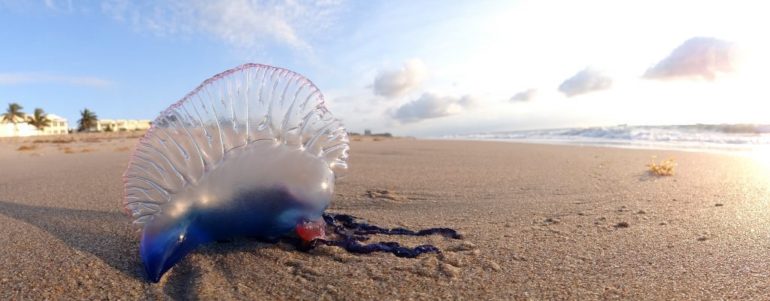
Portuguese man-of-war, like the one found in this photo, produce a potent sting, which are rarely fatal. (Photo credit Mr. Reid)
The Portuguese man-of-war has recently been sited on the Crystal Crescent beaches in the Halifax area. Nova Scotia beach-goers are being warned of the creature, and should be aware of sightings on Canada’s Atlantic coast.
The Portuguese man-of-war — commonly referred to as the ‘floating terror’ — is often considered to be a jellyfish, yet it’s actual make-up of several organisms classifies the creature as a siphonophore. Although it’s balloon-like top may look harmless, its tentacles often grow to be several metres long and can be harmful to humans.
Bethany Nordstrom, a Dalhousie University master’s student of biology, has been studying the dynamic between leatherback sea turtles and jellyfish in Canada’s Atlantic waters. She says there have been approximately four or five sightings of the Portuguese man-of-war this year.
Nordstrom says that Portuguese man-of-war typically inhabit tropical and subtropical climates, and it is uncommon for them to appear on the coast of Nova Scotia.
“This is my second summer studying jellyfish at Dalhousie University, and last summer I was collecting jellyfish observations and I didn’t hear about any Portuguese man-of-war,” said Nordstrom, mentioning that while the creature’s appearance is uncommon in Canadian waters, it is not unusual for them to appear from time-to-time.
While the Portuguese man-of-war typically prefer warmer waters, their rare sightings in Canada’s Atlantic coast are not directly related to warming waters. Nordstrom says a stormy or windy season can change the direction of the creature, causing occasional travel to areas such as the Scotian shelf and the Bay of Fundy.
“The Portuguese man-of-war are completely driven by wind and currents,” Nordstrom said.”They have a balloon-like sail, which helps them keep afloat… so sometimes they can get blown off course and end up on the coast of Nova Scotia.”
Nordstrom says the Portuguese man-of-war’s sting is extremely potent, and the pain can be excruciating, often lasting several hours. While their attacks are not often fatal, she does mention that some people can react very badly to their stings.
In the case that someone is stung, Nordstrom says to spray vinegar on the wound and to apply heat to the affected area to ease the pain. In cases of extreme reactions, she says to consult a doctor immediately if someone feels dizzy or shortness of breath.
Nordstrom says to avoid washed-up Portuguese man-of-war as their tentacles are known to continue to sting for several days after they die.

